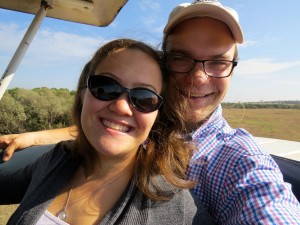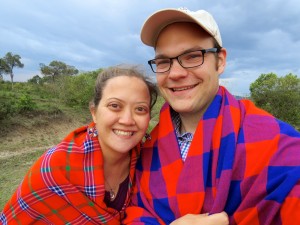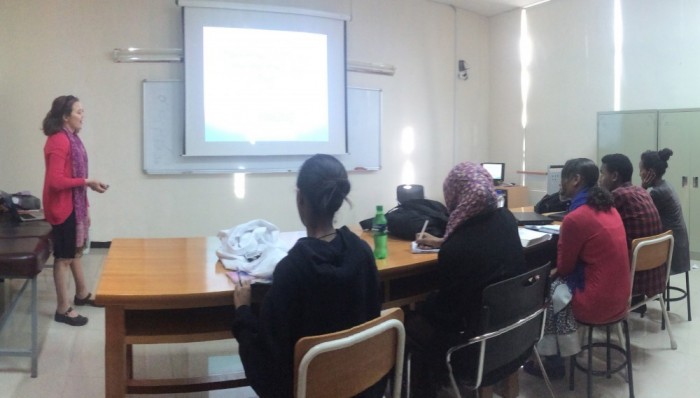 Amy Long Rule (’06, MD ’10) and David “Woody” Rule (’12) overcame disabilities during their undergraduate years to now serve others in Kenya. Amy is a pediatrician at a rural teaching hospital in southwest Kenya and is completing a global child health fellowship through Cincinnati Children’s Hospital. Woody is one of only 12 speech-language therapists in Kenya. Together, they have started a special needs clinic for children in Kenya. Follow their adventures in Amy’s blog, “Beautifully as Possible: A Pediatrician’s Wanderings.”
Amy Long Rule (’06, MD ’10) and David “Woody” Rule (’12) overcame disabilities during their undergraduate years to now serve others in Kenya. Amy is a pediatrician at a rural teaching hospital in southwest Kenya and is completing a global child health fellowship through Cincinnati Children’s Hospital. Woody is one of only 12 speech-language therapists in Kenya. Together, they have started a special needs clinic for children in Kenya. Follow their adventures in Amy’s blog, “Beautifully as Possible: A Pediatrician’s Wanderings.”
Amy, you describe yourself as a “global child health doctor/medical missionary/wandering physician who will work for ethnic food/nomadic pediatrician/gimpy doctor activist.” What does that mean?
I grew up with a disability and that experience shaped the way I looked at many social issues and medicine. I met discrimination at times growing up and as a young adult, this motivated me to advocate for other people with disabilities. My Wake education and my trips overseas gave me the tools to turn that advocacy into activism and vocation. My summers overseas also instilled a deep passion for vulnerable children in general, not just the disabled. The term “missionary” in Sub-Saharan Africa has a very different meaning than it does in churches in North Carolina, thus I have tried to find other terms to describe what I do.
You grew up with a rare bone disease; how did that affect your time at Wake?
I have a form of severe congenital arthritis. By high school, I had the kind of arthritis our grandparents get, particularly in my hips. I did Wake undergrad and Wake Med via “the green machine,” a much beloved wheelchair companion. A lot of people see a wheelchair and think “oh that is terrible.” I see a wheelchair and see liberation. It allowed me to be independent and pursue a Wake Forest education. I can’t say enough about the Wake ADA Taskforce, (Associate Director of the Learning Assistance Center) Michael Shuman, (Chaplain) Ed Christman (’50, JD ’53), (Associate Chaplain) Becky Hartzog, my friends and the pre-med program.
 You’ve had both hips replaced in recent years. Did your disability affect your time in medical school?
You’ve had both hips replaced in recent years. Did your disability affect your time in medical school?
I worked hard, did well and had a great experience. I also developed with another disabled medical student at a different school a curriculum to teach medical students about caring for patients with disabilities. I have continued to go back yearly to give that seminar. I feel so proud to be a Deacon doctor and humbled to have been a pioneer for training physicians with disabilities. I am far more mobile now. I rarely use the wheelchair but I am so grateful that I was at Wake when I did.
You spent several summers on mission trips to Romania through the Baptist Student Union when you were an undergraduate; did that inspire you to further service?
I grew up as a second-generation Navy brat where the concept of Christian service was emphasized and encouraged. I think the idea of volunteer work and serving and working together for God and country was something instilled in me as a young child. Wake gave me the vision and the tools to take that conviction and do something with it. My religion classes on ethics, social justice and human rights gave me the context to envision a vocation that combined my passion for people, my sense that not all was right with the world, particularly in regards to health and disability, and my faith. My first trip overseas grew out of my final paper for human rights. That paper and the resulting summer in Romania doing disability rights work changed everything in my life.

Woody, I understand that you also have a disability?
I grew up with a stutter and actually received my calling to speech-language pathology through my own speech therapy services while I was at Wake Forest. I had learned to manage my speech and avoid stuttering by changing words depending on how hard they are to say; tapping my toes in a rhythm to keep my speech fluent; or by just not talking.
Did Wake Forest instill in you a sense of Pro Humanitate?
From the very beginning, I was given opportunities to serve and focus my studies to have future opportunities to serve humanity. I had two professors who really took me under their wings. (Professor of Russian) Billy Hamilton and I spent almost every semester together in one class or another. I’ll never forget, “Woody, you need to understand your goal by thinking about parachuting into the middle of the jungle, finding the village elder and teaching yourself about the language and culture that surrounds you.” How on earth did he know that I would eventually be, metaphorically speaking, landing in a foreign area in international service and be learning about language and culture other than my own? Another professor who really encouraged me was (Assistant Professor of Spanish) Jerid Francom. He taught me that even if the road isn’t paved, take a machete and make it happen no matter what.


